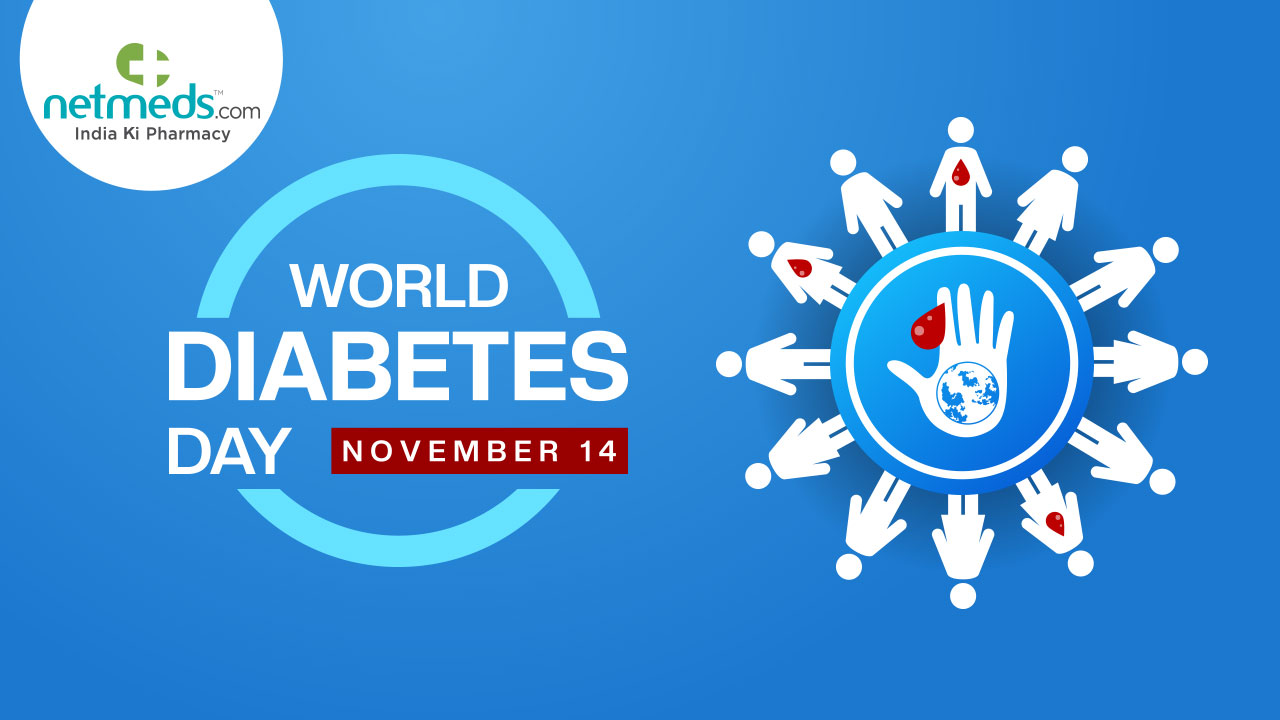Every year on November 14, the world unites to raise awareness about diabetes, a chronic yet preventable lifestyle disorder that affects millions globally. Medical experts reveal that diabetes can impact people across all phases of life, including childhood, the reproductive years, working age and older adulthood. Promoting overall well-being and self-care empowers people living with diabetes at every level.

The theme for this year’s World Diabetes Day is “Diabetes Across Life Stages”, which has been formulated by the World Health Organisation. The theme emphasises that every individual living with diabetes should have the right access to integrated care, supportive environments, and strategies that enhance health and self-management. This health event also stresses the importance of a holistic approach to diabetes prevention, management and overall well-being.
To Manage Diabetes And Optimise Overall Health, Buy From Our Extensive Range of Diabetes Essentials Today!
Diabetes mellitus is a chronic metabolic disorder that develops when the body cannot produce insulin or use insulin effectively (insulin resistance. Insulin’s primary responsibility is to regulate blood glucose levels by letting sugar enter the body cells for energy. When insulin does not function properly, it leads to a spike in blood sugar levels. Diabetes mellitus, if not managed, can result in complications of the heart, kidneys, nerves, eyes and other vital organs.
Significance of World Diabetes Day
World Diabetes Day was initiated by the International Diabetes Federation (IDF) and the World Health Organisation (WHO) to honour the birthday of Sir Frederick Banting, who co-discovered insulin in 1921. From childhood to older age, diabetes prevention and proper care must be integrated across life stages. Supporting overall well-being and self-care helps empower people living with diabetes at every age to deal with this condition.
How Diabetes Impacts Across Different Life Stages
Childhood and Adolescence
Type 1 diabetes is insulin-dependent and requires lifelong insulin therapy. It affects children and young adolescents who need regular self-monitoring to adjust their dose and diet as per the blood sugar levels. Children living with Type 1 diabetes, balancing emotional and social tasks, can be a challenge.
It is essential to educate parents, teachers and society about this condition. Also, regular self-monitoring and encouraging active, balanced lifestyles from an early age can help them manage diabetes effectively.
Young Adults
Young adults are constantly stressed about work pressure, irregular eating habits and late nights can impede blood sugar control.
Modifying lifestyle habits, being physically active, getting regular exercise, having balanced meals, avoiding sugars and regular follow-ups with a doctor can help them immensely to control a surge in blood sugar levels.
Middle Age
Most people are diagnosed with Type 2 diabetes during this phase of life, due to weight gain, hectic lifestyle, work pressure, and slower metabolism.
Regular screening after 30 is vital, maintaining body weight, avoiding smoking and alcohol, and managing stress.
Pregnancy
Gestational diabetes, if not controlled, can affect both the mother and the newborn. Poor blood sugar control can increase the risk of complications.
Regular antenatal screening, having a wholesome and balanced diet, controlled weight gain, and postpartum follow-up to prevent future chances of diabetes.
Older Adults
Elderly people face complications like poor vision, nerve damage, heart disease, and cognitive decline over the years of battling this chronic disorder, if blood sugar levels are uncontrolled.
Proper adherence to medications, getting balanced nutrition, regular exercise suited to physical ability and movement, and emotional support.
As we all know, India is the diabetes capital of the world, with 101.3 million people living with this lifestyle disorder, which is about 11% of the population. However, the good news is that with simple lifestyle changes and following a sustainable food habit, you can go a long way in dealing with diabetes and preventing complications.
5 Healthy Food Practices To Manage Diabetes
Choose Whole Grains Over Refined Carbs
Refined rice, maida, and white bread can spike blood sugar quickly. Substituting them with whole grains like brown rice, millets (ragi, bajra, jowar), quinoa, and whole wheat helps maintain stable glucose levels. Millets are rich in dietary fiber, protein and have a low glycemic index, making them a smart choice and staple food in your meal plan.

Power-up Intake Of Fiber-Rich Foods
A diet rich in fiber slows down glucose absorption and improves the digestive process. Include a rich array of vegetables, lentils, and salads in daily meals. Enjoy traditional Indian dishes like sambar with vegetables, sautéed vegetables sabzi, or sprouted moong salad can be tasty and diabetic-friendly.
Control Portion Sizes/ Meal Timing
Large, heavy meals can cause post-meal sugar spikes. Eating smaller, balanced meals and frequent meals every 3–4 hours helps regulate insulin response. Try using the “quarter plate rule”, which means one-quarter grains, one-quarter protein, and half vegetables.
Cut Down on Added Sugars
Refined sugars, sweets, sugar-laden foods and packaged drinks are commonly consumed in Indian diets. Go for sugar-free beverages, use natural substitutes like stevia and satisfy your sweet craving with fresh fruits in moderate amounts.
Healthy Fats and Proteins
Including healthy fats and superior quality proteins in the meal regimen keeps you satiated and stabilises blood sugar. Add nuts, seeds, paneer, curd, tofu, lean meat and fish to your meals. Prefer cold-pressed oils like mustard, sesame, or groundnut oil instead of hydrogenated fats.
(This article is reviewed by Kalyani Krishna, Chief Content Editor)
Author Profile:
M Sowmya Binu
With over 15 years of expertise and a Postgraduate degree in Nutrition, M Sowmya Binu is a seasoned professional in the field of nutrition. Specialising in tailoring personalised diet plans, she underscores the significance of a balanced approach to health, emphasising the integration of medication with dietary intake for holistic wellness. Passionate about equipping individuals with knowledge to make informed decisions, Sowmya adeptly develops insightful content encompassing various topics, including food, nutrition, supplements, and overall health.
References:
https://www.who.int/campaigns/world-diabetes-day/2025
https://worlddiabetesday.org/
Dietary Advice For Individuals with Diabetes
Andrew Reynolds, BSc, MSc, PhD, MPH and Joanna Mitri, MD, MS.
https://www.ncbi.nlm.nih.gov/books/NBK279012/
https://diabetesjournals.org/care/article-abstract/42/5/731/40480/Nutrition-Therapy-for-Adults-With-Diabetes-or?redirectedFrom=fulltext



 Previous
Previous